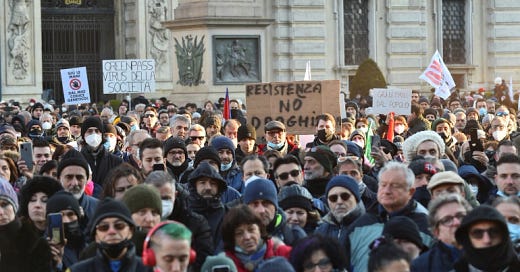
A few days ago the United States Supreme Court blocked Biden’s workplace vaccine mandate.
In the United Kingdom, Health Secretary, Sajid Javid, said that plans to introduce vaccine passports for access to large events will not go ahead. “We shouldn’t be doing things for the sake of it,” the minister said.
Across the channel, on Sunday, 16 January 2022, France took a radically different path and joined Austria, Italy, and Germany among others in the adoption of segregationist policies.
The French parliament voted for the introduction of the Vaccine Passport.
Le Figaro, a French broadsheet, reports that each and every Frenchman will have to divulge and justify his health status “to access leisure activities, restaurants and bars, fairs or interregional public transport” from now on.
For the moment, polls suggest support for the measures. 58% of respondents in France are in favour of the “Vaccine Passport.” A similar number support “Vaccine Mandates,” according to Le Journal du Dimanche, a weekly newspaper, although backing for both measures has dropped markedly in the last two weeks (by 8% and 15% respectively).
President Emmanuel Macron notoriously said in an interview on January 4th 2022, the “unvaccinated, I really want to piss them off. And so we're going to keep on doing it, until the end. That's the strategy.”
He added, “It is a very small minority that resists,” and followed with “an irresponsible person is no longer a citizen.”
By mentioning the words “strategy” and “minority” in the same statement, President Macron led many to suspect electioneering as a key motivator for passing the law. The French Presidential elections are scheduled to take place in three months’ time.
Indeed, during an interview on Europe 1, France’s leading radio broadcaster, Eric Chaume, Head of the Infectious Diseases department at the regional hospital of Pitié-Salpêtrière, said on January 14th 2022 that “this is clearly a mistake,” adding that it had nothing to do with medicine or public health and all to do with the forthcoming election. “It is a display marker and above all a divider,” he said.
From this perspective, the unvaccinated and the partially vaccinated have become a useful and unthreatening cog in a complex political re-election machine.
However, this broad-brush stigmatisation of around 5 million people ought to be a cause for concern.
Not least because the reasons for not vaccinating are more nuanced than the binary world view of smart “vaxxed” versus idiotic “unvaxxed” that dominated the airwaves.
As the Institut National de la Sante et de la Recherche Medical (Inserm) found at least 40% of non-vaccinated have not taken the shot because of access difficulties and remoteness. They are, in other words, France’s poorest.
The other 60% didn’t get the jab out of choice, which in a free society ought to be the end of the story.
However pleasing to some this new law might be in the short term, in the medium to longer-term, politicians might find that the polls they lent on to pass these draconian measures were meaningless.

To start with the unvaccinated and partially vaccinated will be cornered. They will have to choose between submission or job losses. Either way, for them, their friends and relatives, the French Republic and her supposed adherence to universal human rights will have been revealed as an empty bag.
In the longer run though, the laws will reveal themselves deeply unpopular with everyone, including the fully vaccinated.
The government has authorised all and sundry to interject in the lives of others. Every interaction with a third party will therefore become officialised. The nosey neighbour has been given the power to snoop. Nothing can have been designed to irritate the law-abiding more than that.
Experience tells us that what has been granted by the State is not easily withdrawn. That is to say, this will be the new normal for a long time to come.
However, Macron’s denigration of a “very small minority” and the use of the old-fashioned “divide and rule” strategy is interesting for another, perhaps deeper reason.
France is old and ageing fast.
The average age in the country is close to 43. France is a little bit younger than Germany, which at 46 is fast sinking into old age, but much older than Russia and the United States at 39 and 38 respectively.
The most reliable voters are above the median age. Research by Jean-Yves Dormagen and Laura Michel looked at the ageing of voter turn-out from 2002 to 2012 and found that a 65-year-old was 53% more likely to vote than a 29-year-old. The trend has only accelerated as time passed.
Indeed, Vie Publique, the French government agency website, confirmed that voter “abstention has been increasing in the various elections for thirty years. Its increase was clear in the legislative elections, with a record level in 2017.” Only 42% of the eligible population voted that day.
It seems increasingly plausible that the political machinery of France is geared towards responding to the desires and fears of its ageing electorate, not of the broader population. After all, perversely, in a democratic system, it is the people who vote that matter to ambitious politicians. Those who don’t or who can’t are naturally a derivative concern.
Not being allowed to vote and being part of a minority puts you in double jeopardy. In France, one in ten is under 10 years old. In fact, there are almost as many adults in France who believe the earth is flat as there are pre-teen children. That is to say, they are extremely rare.

Unable to voice their opinions and at the mercy of powerful groups though, children have been the greatest victims of COVID policies designed to re-assure their ageing and often childless elders. The continuing passing of health laws, changing of health protocols, as well as forcing the one group of society least affected by the virus into perpetual cycles of lockdowns and restrictions speaks of a deep-seated “scorn” for the young.”
A record 15,000 classes have been closed since the beginning of the year, a number matched only by similar closures two years ago at the height of the pandemic. In addition, most other activities for children have been curtailed or cancelled.
As the new law says “minors between the ages of 12 and 15 will still be required to present the current health pass.” For them and their younger peers, the idea of a France in which you could walk around your city streets without a care in the world will be confined to the realm of science fiction.
While France is turning against the future, it is to be hoped that England and the US still have enough self-confidence to embrace it and keep individual freedoms as the unshakable cornerstone of their governing philosophy.




